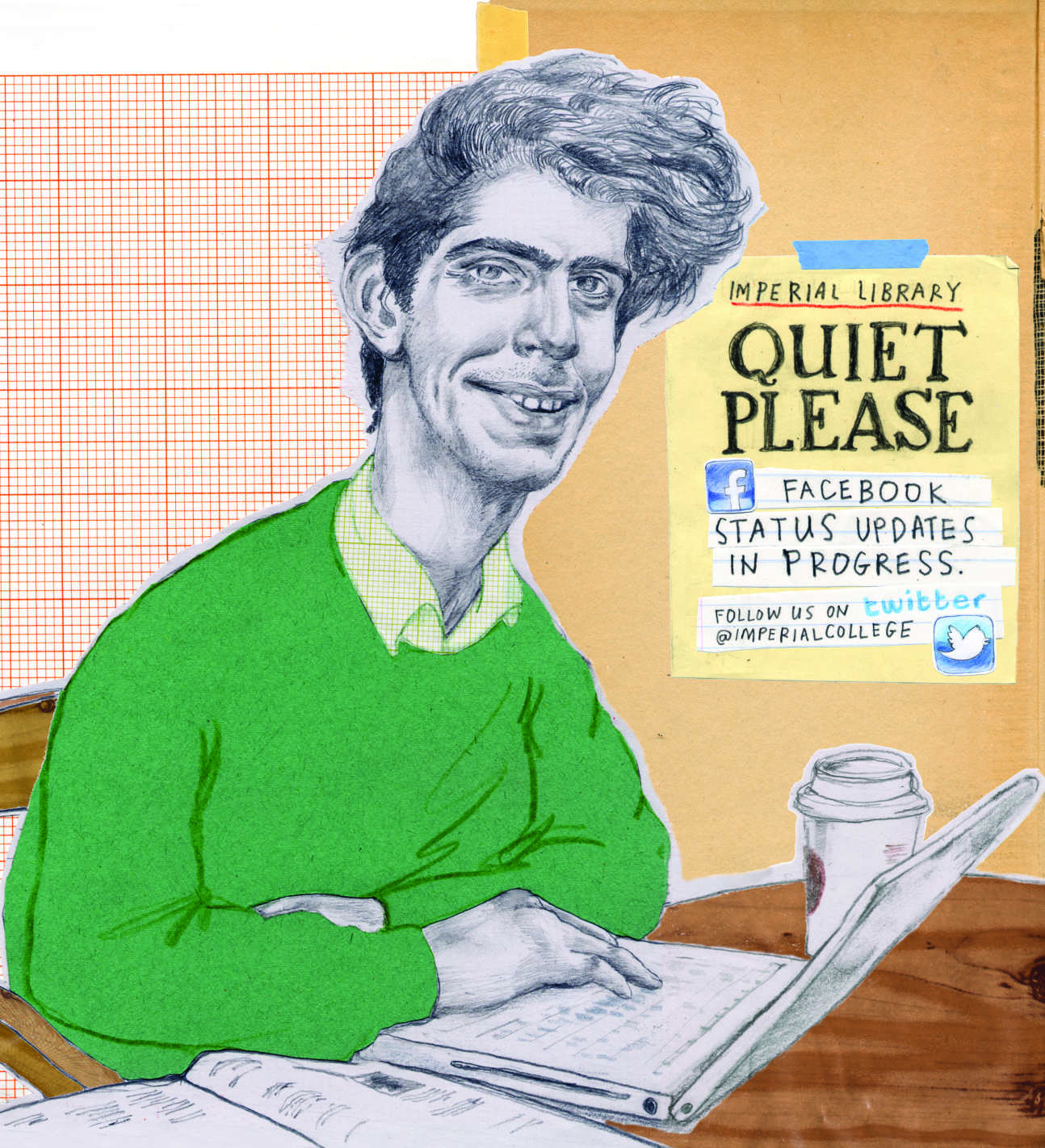Social science
Students can’t get by today without a life online, says Kadhim Shubber
Illustration: David Fullarton
It’s hot. Uncomfortably hot. Unbearably hot. Library hot. The bright sunshine that those fortunate souls out there are enjoying on the Queen’s Lawn, not only makes revision all the more difficult but adds insult to injury, by powering the rather unpleasant greenhouse effect in the library.
Rows upon rows of computers only exacerbate the problem. It’s a quirk of the twentyfirst century that students value the Central Library more for its computers than its books. (Empty desks are also appreciated; plenty of elbow room to use our laptops, smartphones and iPads). But this is inevitable. Computers, and in particular the social networks that we access through them, are an indispensable part of university life.
Perhaps the biggest story so far this year, an event that brought students out to protest in December, was the restructure of the Department of Life Sciences announced last summer, which led to 14 redundancies. Leaving aside the arguments for or against the restructure, it demonstrated the importance of online social networks in modern protest. Over 1,000 students (and some of their lecturers) discussed the changes in a protest group on Facebook and through events they rallied hundreds to show their discontent. By contrast, neither the proposed hike in tuition fees, nor the cuts to higher education funding, elicited much more than a shrug from the student body at Imperial –whether this shows acumen or apathy is debatable. I suspect that the former is true; Imperial College Union was one of only two student unions, of which I know, to publicly support the Browne Review.
A more sombre use of social networks like Facebook emerged after the disappearance of Anthony Soh, a first year Mechanical Engineering student in March. Social media drove efforts to find him. Thousands of people came together in a group dedicated to raising awareness about him; when it comes to getting attention, with over 26 million Facebook users in the UK today, posters on Facebook are just as important as posters on streets. When the sad news of his death emerged, the memorial page on Facebook became a place for people to recount their memories of him and express their grief. May he rest in peace.
On the other hand, the limitations of the online world are as obvious at Imperial as its successes. An online marketplace, called iConnect and created by a group of entrepreneurial students, has yet to threaten the poster boards on the Walkway as the place of choice to advertise for new flatmates. Candidates running recently for positions in the Students’ Union created Facebook groups, but they all learnt that it’s face-time on the ground that actually wins votes. Though Facebook helps us to remember the names of all the people that we meet in Freshers’ Week, it’s in the physical world that we truly make and maintain our friendships. Despite this, however, Facebook (and to a lesser extent, Twitter) has become a forum for Imperial’s community to coalesce. We live parallel lives; a physical one and a digital one. After the Varsity rugby match between the Medics and the College, the banter continued online when Felix uploaded photos of the match. As Imperial’s Racing Green Endurance team drove from Alaska to Argentina in an electric sports car, we followed their adventures on Twitter. When I want to have a party, or organise drinks with my friends, I create an event on Facebook.
Ultimately, if you can’t get online, then you can’t fully participate in Imperial’s community. For that reason the demand for computers in the library is unlikely to abate. In response, the library has launched a new feature at the entrance that lets you know where you can find a free computer. Unfortunately it doesn’t solve the perennial problem of finding that your ‘free’ computer has been claimed by an elusive character who has marked their territory with a bag and some books – the limitations of technology strike again.
Kadhim Shubber is Editor of Felix, the Imperial College London student newspaper. He is on sabbatical from his Physics degree for a year.